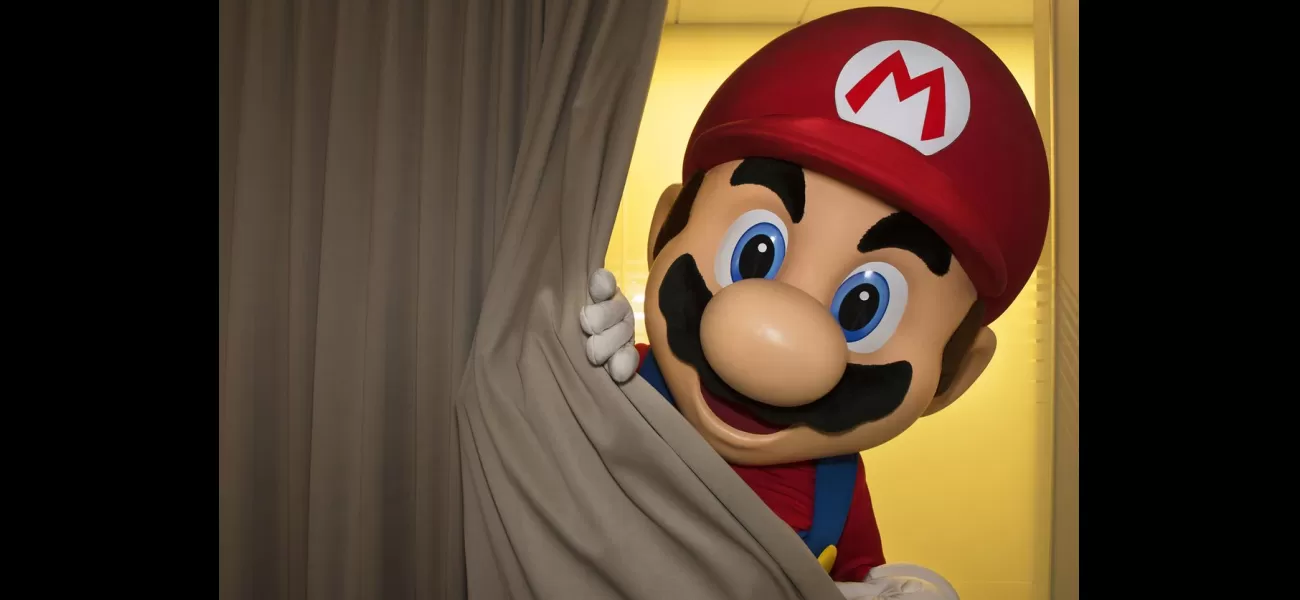Nintendo's future in a rule-breaking gaming industry.
GameCentral wonders how Nintendo will deal with gaming crisis as chances of Feb Direct decrease.
January 25th 2024.

What Will the Future Hold for Mario and His Friends?
As the possibility of a February Nintendo Direct fades away, GameCentral ponders on how the House of Mario will navigate through the current crisis in the gaming industry. Speculating about Nintendo's plans requires more than just knowledge of the industry - it's almost like having a crystal ball. No matter how much one may think they understand the world of gaming, it has always proven to be futile to try to predict Nintendo's next move. This is one of their greatest strengths - they are unpredictable and unafraid to take risks and try new things, which can either lead to unexpected success or unfortunate failure.
Some may argue that products such as the Virtual Boy and Wii U were more of a folly than calculated risks, but the fact remains that it is impossible to anticipate what Nintendo will do next. Their next console, rumored to be called the Switch 2, may have similar functionalities to the current Switch but with more power and possibly some new features. However, it could also be something completely different. This has been the case with all their previous console reveals, but this time, it will happen amidst a time of turmoil in the industry, with rising development costs, uncertainties surrounding subscription services and streaming, and the impact of the ongoing pandemic.
Nintendo has hinted that recent games, like Zelda: Tears Of The Kingdom, have been incredibly expensive to develop. However, their success is largely due to the fact that, unlike their competitors Sony and Microsoft, their games are not massive projects costing over $200 million and risking dire consequences if they underperform. One of the ways Nintendo keeps costs down is by purposefully creating underpowered consoles, which often cannot run the same games as PlayStation and Xbox. While this has been true in the past, with each new generation, it becomes less so. If the Switch 2 is more powerful, it will require more resources and manpower to create games that match the graphical standards of the PlayStation 4 and Xbox One.
This will inevitably have an impact on profits and the speed at which Nintendo can release new games. Despite the challenges posed by the pandemic, Nintendo has managed to maintain a steady release schedule for the Switch, both in terms of quantity and quality. This was made possible by not having to support a separate portable console alongside the Switch. However, as they strive to keep the Switch going for as long as possible, they may face difficulties in pushing beyond its graphical capabilities to incorporate more complex graphics. This could prove to be a much bigger risk than many fans realize.
One question that arises is how much more money Nintendo is willing to spend on individual games, especially in the context of the constant job cuts and predictions of continued layoffs for the next two years. While PlayStation and Xbox may have already crossed a line from which they cannot retreat, Nintendo may have identified this problem from the sidelines. However, what is their answer to avoid falling into the same trap? Will they ensure that their consoles are never more powerful than the current Switch?
Another aspect to consider is streaming and the trend towards going multi-platform, which Microsoft and even Sony, according to their CEO, see as the future of gaming. Nintendo has experimented with streaming on the Switch, but they do not have access to the same worldwide data centers as Microsoft. This means that they will have to team up with another company for streaming, something that Nintendo is notoriously uncomfortable with.
While streaming may not become a major factor for a few more years, there is also the recent trend of claiming that PC and mobile are just as significant, if not more so, than dedicated gaming hardware. Nintendo's foray into mobile gaming was driven by the failure of the Wii U and was always met with reluctance, indicating a clear distaste for the medium. As soon as the Switch proved to be a success, Nintendo seemed to lose interest in mobile gaming. In 2020, they even stated that the experiment was essentially over.
The idea of modern Zelda or Mario games appearing on PC seems far-fetched for various reasons. First and foremost, exclusive first-party games are a significant reason why people buy Nintendo consoles. Additionally, unlike other companies, Nintendo designs both hardware and software in tandem, with specific games influencing the console's design since the Nintendo 64 days. Even minor issues like fan-made mods would make Nintendo recoil in horror at the thought of losing complete control over their games' hardware.
But, if this is the reality of the market now or in the coming years, will Nintendo have any choice but to embrace it? Faced with the prospect of releasing games on PC and mobile, will they choose to give up and return to making playing cards, or will they be more pragmatic, as they were with their first mobile experiment? With the industry at a point where Nintendo may need outside help to compete, Microsoft, who has been wanting to buy Nintendo for decades, could be the obvious suitor. This is especially true since Sony seems to have never forgiven them for the SNES CD-ROM and the last time Nintendo collaborated with a competitor, it led to the creation of the PlayStation.
What Does the Future Hold for Mario and Co.?
As we wait for news of a possible February Nintendo Direct, the gaming world is abuzz with speculation about how the House of Mario will respond to the current crisis. Trying to predict Nintendo's next move is like trying to read a crystal ball – it requires more luck than industry knowledge. Their unpredictable nature is both a strength and a risk, as their willingness to take risks and experiment can lead to either great success or disappointing results.
Some may argue that past hardware releases, such as the Virtual Boy and Wii U, were more folly than calculated risks. However, it's impossible to know what Nintendo will do at any given moment. Their upcoming console, the rumored Switch 2, may have some similarities to the current Switch with upgraded specs and new features, but it could also be something completely different.
This unpredictability has been a common theme with Nintendo's previous console reveals. However, this time around, they will be making their announcement amidst a tumultuous time in the gaming industry. Rising costs of development, uncertainties about subscription services and streaming, and the effects of the pandemic are all factors that Nintendo will need to consider.
While Nintendo has hinted at the high costs of developing recent games such as Zelda: Breath of the Wild, one of their key strengths is that their games are not the $200+ million budgeted titles that Sony and Microsoft release. This means that their games are not under immense pressure to perform well, and they can take more creative risks. However, as technology advances, the cost of making games also increases. If the Switch 2 is more powerful, Nintendo will need to invest more resources and money to create games that can compete with those on the PlayStation and Xbox.
This shift in focus could potentially affect the speed at which Nintendo releases new games, as well as their profits. The Switch has had a steady stream of both quantity and quality games, thanks in part to not having to support a separate portable console. However, this benefit may diminish if Nintendo has to put more resources into creating graphically advanced games.
Nintendo has expressed a desire to keep the Switch going for as long as possible, as it represents a sweet spot in terms of graphics and development time for high-quality games. Pushing beyond this comfort zone could be a significant risk for Nintendo, as the costs and time needed to create more complex graphics could potentially hinder their success.
As the gaming industry shifts towards streaming and cross-platform compatibility, Nintendo's approach may be vastly different from their competitors. While they have experimented with streaming on the Switch, they do not have access to the same resources as Microsoft. This may require them to team up with other companies, something that Nintendo has traditionally been hesitant to do.
The sudden focus on PC and mobile gaming as equal competitors to traditional gaming consoles may also pose a challenge for Nintendo. Their experiments with mobile gaming were met with reluctance and only happened due to the failure of their previous console, the Wii U. As soon as the Switch became a hit, they seemed to lose interest in the mobile market and have since shifted their focus back to their own console.
The idea of Nintendo's beloved franchises, such as Zelda and Mario, appearing on PC may seem far-fetched. Exclusive first-party games are a significant draw for Nintendo consoles, and they are known for designing both hardware and software in tandem. Even the idea of fan-made mods may make Nintendo cringe, as they value having complete control over their games and hardware.
However, as the market continues to evolve, will Nintendo have to adapt and embrace these changes? Will they have to release games on PC and mobile to remain competitive, or will they stick to their traditional approach? The question of whether Nintendo should team up with a rival or not has been a topic of debate for years, with Microsoft being a potential suitor. But with their complicated history, would this be a wise decision for Nintendo?
As we eagerly await Nintendo's next move, one thing is for sure – the future holds many challenges and opportunities for Mario and his friends. Only time will tell how they will navigate the ever-changing landscape of the gaming industry.
As the possibility of a February Nintendo Direct fades away, GameCentral ponders on how the House of Mario will navigate through the current crisis in the gaming industry. Speculating about Nintendo's plans requires more than just knowledge of the industry - it's almost like having a crystal ball. No matter how much one may think they understand the world of gaming, it has always proven to be futile to try to predict Nintendo's next move. This is one of their greatest strengths - they are unpredictable and unafraid to take risks and try new things, which can either lead to unexpected success or unfortunate failure.
Some may argue that products such as the Virtual Boy and Wii U were more of a folly than calculated risks, but the fact remains that it is impossible to anticipate what Nintendo will do next. Their next console, rumored to be called the Switch 2, may have similar functionalities to the current Switch but with more power and possibly some new features. However, it could also be something completely different. This has been the case with all their previous console reveals, but this time, it will happen amidst a time of turmoil in the industry, with rising development costs, uncertainties surrounding subscription services and streaming, and the impact of the ongoing pandemic.
Nintendo has hinted that recent games, like Zelda: Tears Of The Kingdom, have been incredibly expensive to develop. However, their success is largely due to the fact that, unlike their competitors Sony and Microsoft, their games are not massive projects costing over $200 million and risking dire consequences if they underperform. One of the ways Nintendo keeps costs down is by purposefully creating underpowered consoles, which often cannot run the same games as PlayStation and Xbox. While this has been true in the past, with each new generation, it becomes less so. If the Switch 2 is more powerful, it will require more resources and manpower to create games that match the graphical standards of the PlayStation 4 and Xbox One.
This will inevitably have an impact on profits and the speed at which Nintendo can release new games. Despite the challenges posed by the pandemic, Nintendo has managed to maintain a steady release schedule for the Switch, both in terms of quantity and quality. This was made possible by not having to support a separate portable console alongside the Switch. However, as they strive to keep the Switch going for as long as possible, they may face difficulties in pushing beyond its graphical capabilities to incorporate more complex graphics. This could prove to be a much bigger risk than many fans realize.
One question that arises is how much more money Nintendo is willing to spend on individual games, especially in the context of the constant job cuts and predictions of continued layoffs for the next two years. While PlayStation and Xbox may have already crossed a line from which they cannot retreat, Nintendo may have identified this problem from the sidelines. However, what is their answer to avoid falling into the same trap? Will they ensure that their consoles are never more powerful than the current Switch?
Another aspect to consider is streaming and the trend towards going multi-platform, which Microsoft and even Sony, according to their CEO, see as the future of gaming. Nintendo has experimented with streaming on the Switch, but they do not have access to the same worldwide data centers as Microsoft. This means that they will have to team up with another company for streaming, something that Nintendo is notoriously uncomfortable with.
While streaming may not become a major factor for a few more years, there is also the recent trend of claiming that PC and mobile are just as significant, if not more so, than dedicated gaming hardware. Nintendo's foray into mobile gaming was driven by the failure of the Wii U and was always met with reluctance, indicating a clear distaste for the medium. As soon as the Switch proved to be a success, Nintendo seemed to lose interest in mobile gaming. In 2020, they even stated that the experiment was essentially over.
The idea of modern Zelda or Mario games appearing on PC seems far-fetched for various reasons. First and foremost, exclusive first-party games are a significant reason why people buy Nintendo consoles. Additionally, unlike other companies, Nintendo designs both hardware and software in tandem, with specific games influencing the console's design since the Nintendo 64 days. Even minor issues like fan-made mods would make Nintendo recoil in horror at the thought of losing complete control over their games' hardware.
But, if this is the reality of the market now or in the coming years, will Nintendo have any choice but to embrace it? Faced with the prospect of releasing games on PC and mobile, will they choose to give up and return to making playing cards, or will they be more pragmatic, as they were with their first mobile experiment? With the industry at a point where Nintendo may need outside help to compete, Microsoft, who has been wanting to buy Nintendo for decades, could be the obvious suitor. This is especially true since Sony seems to have never forgiven them for the SNES CD-ROM and the last time Nintendo collaborated with a competitor, it led to the creation of the PlayStation.
What Does the Future Hold for Mario and Co.?
As we wait for news of a possible February Nintendo Direct, the gaming world is abuzz with speculation about how the House of Mario will respond to the current crisis. Trying to predict Nintendo's next move is like trying to read a crystal ball – it requires more luck than industry knowledge. Their unpredictable nature is both a strength and a risk, as their willingness to take risks and experiment can lead to either great success or disappointing results.
Some may argue that past hardware releases, such as the Virtual Boy and Wii U, were more folly than calculated risks. However, it's impossible to know what Nintendo will do at any given moment. Their upcoming console, the rumored Switch 2, may have some similarities to the current Switch with upgraded specs and new features, but it could also be something completely different.
This unpredictability has been a common theme with Nintendo's previous console reveals. However, this time around, they will be making their announcement amidst a tumultuous time in the gaming industry. Rising costs of development, uncertainties about subscription services and streaming, and the effects of the pandemic are all factors that Nintendo will need to consider.
While Nintendo has hinted at the high costs of developing recent games such as Zelda: Breath of the Wild, one of their key strengths is that their games are not the $200+ million budgeted titles that Sony and Microsoft release. This means that their games are not under immense pressure to perform well, and they can take more creative risks. However, as technology advances, the cost of making games also increases. If the Switch 2 is more powerful, Nintendo will need to invest more resources and money to create games that can compete with those on the PlayStation and Xbox.
This shift in focus could potentially affect the speed at which Nintendo releases new games, as well as their profits. The Switch has had a steady stream of both quantity and quality games, thanks in part to not having to support a separate portable console. However, this benefit may diminish if Nintendo has to put more resources into creating graphically advanced games.
Nintendo has expressed a desire to keep the Switch going for as long as possible, as it represents a sweet spot in terms of graphics and development time for high-quality games. Pushing beyond this comfort zone could be a significant risk for Nintendo, as the costs and time needed to create more complex graphics could potentially hinder their success.
As the gaming industry shifts towards streaming and cross-platform compatibility, Nintendo's approach may be vastly different from their competitors. While they have experimented with streaming on the Switch, they do not have access to the same resources as Microsoft. This may require them to team up with other companies, something that Nintendo has traditionally been hesitant to do.
The sudden focus on PC and mobile gaming as equal competitors to traditional gaming consoles may also pose a challenge for Nintendo. Their experiments with mobile gaming were met with reluctance and only happened due to the failure of their previous console, the Wii U. As soon as the Switch became a hit, they seemed to lose interest in the mobile market and have since shifted their focus back to their own console.
The idea of Nintendo's beloved franchises, such as Zelda and Mario, appearing on PC may seem far-fetched. Exclusive first-party games are a significant draw for Nintendo consoles, and they are known for designing both hardware and software in tandem. Even the idea of fan-made mods may make Nintendo cringe, as they value having complete control over their games and hardware.
However, as the market continues to evolve, will Nintendo have to adapt and embrace these changes? Will they have to release games on PC and mobile to remain competitive, or will they stick to their traditional approach? The question of whether Nintendo should team up with a rival or not has been a topic of debate for years, with Microsoft being a potential suitor. But with their complicated history, would this be a wise decision for Nintendo?
As we eagerly await Nintendo's next move, one thing is for sure – the future holds many challenges and opportunities for Mario and his friends. Only time will tell how they will navigate the ever-changing landscape of the gaming industry.
[This article has been trending online recently and has been generated with AI. Your feed is customized.]
[Generative AI is experimental.]
0
0
Submit Comment





